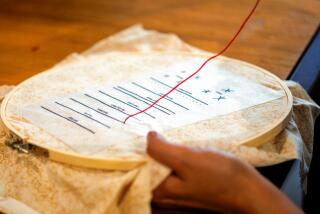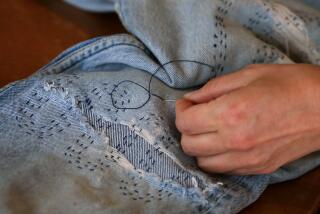Carol Mudd of Zen Home Stitchery in Costa Mesa finds a peace of the action in a rich market. And it was meditation that showed her the way.
- Share via
How many outfits in your wardrobe have a 2,500-year history? If you’re Carol Mudd, owner of Zen Home Stitchery in Costa Mesa, most of them do.
Her company, one of three that cater to the estimated 500,000 Zen practitioners in this country, ships merchandise as far as Saudi Arabia.
“There is an enormous market for these clothes. I’m seeing more and more people who aren’t doing Zen meditation buying them. Some like the clothes because they’re comfortable for sitting on the floor and studying or eating in.
“And since they are vestments, there is a peace to them. That seems especially appealing in this world of so many loud noises,” said Mudd, who has practiced Zen for 17 years and will be ordained a priest in April.
Her involvement with Zen meditation led her into her clothing business.
“I was basically given this business in 1982 by the Zen Center of Los Angeles,” Mudd said. “They had a small stitchery shop that they were closing down.”
She began by making meditation cushions with a sewing machine borrowed from her mother. From that start, she expanded into a line of clothes, doing most of the work herself at home. In 1995, she rented a shop and work space in Costa Mesa and added a staff of four.
“Before, we were mainly a mail-order company, but now with the move, our showroom business has doubled in the last six months,” she said.
Zen Home Stitchery makes two styles of jackets ($60-$70), pants ($35), a hakama--skirt--($80), lay robe ($130), kimono ($75), jubon--shirt--($35) and monk’s shoulder bag ($35).
Recently, Mudd designed clothes for a samurai wedding that took place at the Zen Mountain Center in Idyllwild.
“The groom wanted to use the samurai theme of the spirit of courage and relationship for his wedding,” she said. “We did the clothes in cream and black silks, and the couple had their buttons done by a silversmith.”
The groom wore a traditional black silk vest over a cream silk shirt with a mandarin collar, black Japanese-style raw silk pants and a black traveling robe with a black obi or sash.
The bride’s dress was cream sueded silk with a mandarin collar. She wore a cream kimono of woven silk over it. An altar cloth was made out of the silk from her wedding dress surrounded by the black silk from his robe.
“The thing I like about Zen clothes and what makes them different from Western-style ones is that they are not fitted. They have no darts or particular shape to them,” Mudd said. “They’re interesting to sew because all the pieces are squares and rectangles, which create very simple, strong lines.
“Robes, kimonos, shirts and jackets have loose, usually three-quarter-length sleeves. They’re called field or work jackets because when you’re doing office work or fieldwork, the sleeves don’t get in the way. You might see shoulder pads in Western clothes, but this design actually gives a square appearance to the body without shoulder pads.”
The shoulders appear broader also because the sleeves are square inserts.
Most of the Zen clothes that Mudd makes come in black, brown, navy blue or gray--subdued colors that aren’t distracting during meditation. She is adding to her collection with shirts, vests and other clothes from vintage fabrics from China, Japan, Guatemala and India.


